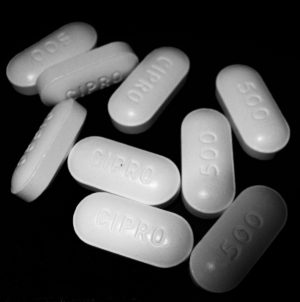 Despite our efforts to live as healthy as possible, we can still get sick. This goes for those adhering to a whole foods, plant-based diet too. We all live inside a human body, and this body is not indestructible regardless of how much we wish it were.
Despite our efforts to live as healthy as possible, we can still get sick. This goes for those adhering to a whole foods, plant-based diet too. We all live inside a human body, and this body is not indestructible regardless of how much we wish it were.
When we do get sick, and it’s due to a bacterial infection, antibiotics are often prescribed. There are many antibiotics available for physicians to use and all of them have unique characteristics that separate them from one another. Not every antibiotic can be used for every infection. It takes a well-trained and astute clinician to pick the right antibiotic for the right bacteria. Another item that complicates things is many times your healthcare provider might not know exactly what bug is causing your specific infection unless cultures are taken, sent to the lab, and examined. Therefore, your doctor and the rest of your healthcare team (including pharmacists) do their best to treat every patient’s infection with the most appropriate antibiotics.
With that being said, I wanted to take time today to highlight one particular class of antibiotics that I think warrants caution before being used. This would be the fluoroquinolone class of antibiotics—Levaquin (levofloxacin), Cipro (ciprofloxacin), and Avelox (moxifloxacin).
What Are Fluoroquinolones Used For?
This class of antibiotics is used for several different infections including urinary tract infections, intra-abdominal infections (diverticulitis, Crohn’s disease, gall bladder infections, etc.), upper and lower respiratory tract infections (sinus infections, pneumonia, etc.), anthrax, infections of the prostate gland, and many more.
While fluoroquinolones can work well against many different types of bacteria, there is an increasing resistance developing amongst these same bacterial strains in some patients. Consequently, this means fluoroquinolones won’t work for these resistant infections. It results in patients and doctors having less ammunition in their arsenal of antibiotics to treat these infections.
We don’t even use fluoroquinolones to fight some infections anymore because of bacterial resistance patterns. Gonorrhea, a sexually transmitted disease, is one example of this.1 Ciprofloxacin is virtually worthless against this infection today.
Some of this resistance is due to overuse of fluoroquinolones in humans, but some is due to overuse in animals farmed for human consumption.2 This is the case in Europe where some poultry farms raising chickens and turkeys have fluoroquinolone-resistant strains of E. coli showing up.3 Fluoroquinolone use in poultry is actually banned in the United States due to this sort of problem.
What Are the Potential Side Effects of Fluoroquinolones?
 Like all other medications, fluoroquinolones have potential side effects that can be dangerous for patients. For many years, I have been very vocal about some of these side effects because of how serious they are. In fact, I’ve even recommended to my own family and friends not to use this class of antibiotics because of these side effects.
Like all other medications, fluoroquinolones have potential side effects that can be dangerous for patients. For many years, I have been very vocal about some of these side effects because of how serious they are. In fact, I’ve even recommended to my own family and friends not to use this class of antibiotics because of these side effects.
Before mentioning the most worrisome adverse effects of the fluoroquinolones, I’d like to list the common side effects associated with them and all antibiotics. These include nausea/vomiting, upset stomach, diarrhea, headache, and possible rash. These side effects occur in 1%-10% of patients and are not usually life-threatening, with the exception of a rare anaphylactic allergic-type reaction (may or may not include rash) that can occur with any antibiotic.
The most serious side effects of fluoroquinolones are what really concern me. These include possible cardiac arrhythmias, muscle and joint pain, tendinitis/tendon rupture, nerve pain (peripheral neuropathy), psychiatric disturbances, retinal detachments, and aortic aneurysms (potentially life-threatening enlargement of the aorta).4-8 These side effects occur in up to 2% of patients and can have devastating, life-altering effects on them.
The nerve pain and tendon conditions can actually be permanent, disabling someone for the rest of their life. I’ve personally known at least one individual who led an active lifestyle until being devastated by tendon issues while taking ciprofloxacin. This gentleman ended up having difficulty even walking, let alone playing sports like he was apt to doing.
These serious side effects are so concerning that the FDA has issued special communication warnings and black box warnings to the public and medical professionals. Black box warnings are the most serious of all warnings and are required to be included on package inserts of applicable drugs supplied to pharmacies from the manufacturers. These black box warnings for the fluoroquinolone drugs include the tendon issues and muscle and joint pain in certain patient populations.
Recently, on May 12, 2016 the FDA issued a special Drug Safety Communication warning regarding fluoroquinolone use. It reads as follows:9
“The U.S. Food and Drug Administration is advising that the serious side effects associated with fluoroquinolone antibacterial drugs generally outweigh the benefits for patients with acute sinusitis, acute bronchitis, and uncomplicated urinary tract infections who have other treatment options. For patients with these conditions, fluoroquinolones should be reserved for those who do not have alternative treatment options. An FDA safety review has shown that fluoroquinolones when used systemically (i.e. tablets, capsules, and injectable) are associated with disabling and potentially permanent serious side effects that can occur together. These side effects can involve the tendons, muscles, joints, nerves, and central nervous system.”
So it’s not just me who’s sounding the alarm on these medications. The FDA has finally officially come out to warn the public and medical professionals against the use of these antibiotics in common infections typically treated on an outpatient basis. I hope this hits home to those who hear this message because it is not something that should be taken lightly.
Conclusions
The fluoroquinolones have been used for many years for many different types of infections. They have helped many patients fight off terrible infections, but they do not come without their inherent risks.
Antibiotic resistance has been increasing in recent years with these drugs and can potentially preclude the use of them for some infections.
In addition and even more concerning, potential serious adverse effects can and do happen in some patients. These can be permanent and disabling and warrant careful consideration before physicians and patients choose to use these drugs. There are many different classes of antibiotics available to treat all types of infections. I, personally, would reserve the fluoroquinolones as the antibiotic of last resort if I had an infection commonly treated by them. I would recommend the same to others.

If you like what you see here, then you’ll LOVE my daily Facebook and Twitter posts! Also, don’t forget to sign up for my Free Online Mailing List to get all the latest updates from the Plant-Based Pharmacist!
Check out my book, The Empty Medicine Cabinet, to start your journey towards better health. This step-by-step guide leads you through many of today’s common chronic diseases (heart disease, obesity, diabetes, cancer, and more), giving you the facts on food versus medication in treating these medical conditions. The book also contains an easy-to-follow guide on how to adopt a whole foods, plant-based diet as a part of an overall lifestyle change, producing the best possible health outcomes for you and your family. Hurry and get your copy today!
References:
1 Dan M. The use of fluoroquinolones in gonorrhea: the increasing problem of resistance. Expert Opin Pharmacothera. 2004 Apr;5(4):829-54.
2 Piddock LJ. Fluoroquinolone resistance: overuse of fluoroquinolones in human and veterinary medicine can breed resistance. BMJ. 1998 Oct 17;317(7165):1029-30.
3 Vanni M, Meucci V, Tognetti R, et al. Fluoroquinolone resistance and molecular characterization of gyrA and parC quinolone resistance-determining regions in Escherichia coli isolated from poultry. Poult Sci. 2014 Apr;93(4):856-63.
4 Daneman N, Lu H, Redelmeier DA. Fluoroquinolones and collagen associated severe adverse events: a longitudinal cohort study. BMJ Open. 2015 Nov 18;5(11):e010077. doi:10.1136/bmjopen-2015-010077.
5 Golomb BA, Koslik HJ, Redd AJ. Fluoroquinolone-induced serious, persistent, multisymptom adverse effects. BMJ Case Rep. 2015 Oct 5;2015. doi:10.1136/bcr-2015-209821.
6 Mehrzad R, Barza M. Weighing the adverse cardiac effects of fluoroquinolones: A risk perspective. J Clin Pharmacol. 2015 Nov;55(11):1198-206.
7 Lee CC, Lee MT, Chen YS, et al. Risk of Aortic Dissection and Aortic Aneurysm in Patients Taking Fluoroquinolone. JAMA Intern Med. 2015 Nov;175(11):1839-47.
8 Tome AM, Filipe A. Quinolones: review of psychiatric and neurological adverse reactions. Drug Saf. 2011 Jun 1;34(6):465-88.
9 U.S. Food and Drug Administration. FDA Drug Safety Communication: FDA advises restricting fluoroquinolone antibiotic use for certain uncomplicated infections; warns about disabling side effects that can occur together. Available: http://www.fda.gov/Drugs/DrugSafety/ucm500143.htm. Accessed: 5 Jun 2016.


.jpg)
Dustin, I wish this article had come out last year. This past November I had a bout with diverticulitis, which took me by complete surprise. I had changed to a plant based diet back in January 2012 and had been feeling great. I had never had this illness before so it completely floored me. I was prescribed 2 antibiotics, one of which was cipro. I forget the other right now. Within 2 days, I then developed thrush in the mouth, so of course, I had to take something else for that. I have been working on getting my gut bacteria reinstated ever since. Antibiotics are horrible.
Hi Dustin, what an amazing find. I found your blog through Eating You Alive site. When I saw this article on fluoroquinolones, I had to read it because I had a very severe reaction to Levaquin back in 2006. For two years, I was in very bad shape and unable to perform many of my daily activities and job-related duties (I was a reading specialist/literacy coach in a public school). Since then, I have struggled with recurring vibrating and numbness in my lower spine, legs, and feet. I am one of the lucky ones because I have recovered to a level where I am actually living a healthier lifestyle than I once was and enjoying life in ways that I had never imagined.
Which is how I came to find you! Since adopting a whole foods plant-based lifestyle nearly three years ago, I have been amazed to reap the benefits of weight loss, better skin, and hardly ever being sick (which would have been lovely back in 2006 because I was taking Levaquin to treat a sinus infection).
I tell everyone I know NOT to take these medications unless their condition is life-threatening. I would never, under any circumstances, take them again.
Many thanks to you for sharing this information with others. I have yet to find a physician who will entertain the thought that fluoroquinolones could have caused the issues I was having, but I have met many wonderful people through the Floxie Hope website and will continue to spread the word myself. Taking my health back through my own actions has been very empowering, and I refuse to be bitter. Life is too wonderful to waste.
Your work is much appreciated!
Thank you Tammy. I’m so glad to hear you recovered from those adverse effects. Many do not unfortunately. We need more people leading by example living a healthy lifestyle like yourself. Keep up the great work!
Dustin